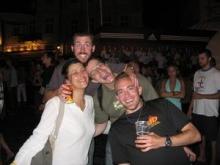Dean Martin, the patron saint of all 21st century lushes, once said, "It was a woman who drove me to drink. Come to think of it, I never did hang around to thank her for that." Though Deano's wit was as dry his his martini ever was, there's a kernel of truth to this particular off-hand comment. The greatest motivator for the consumption of alcohol always has been and always will be people. More specifically, people who are strangers and might not be soon. We drink to meet people who will sleep with us, be friends with us, or even fight us without a question. That's why there's nary an armrest between you and the next person at the bar. We drink to be closer to people than we usually let ourselves be while sober.
One of the first observed effects of ethanol on the human brain is the famously vague "lowering of inhibitions". In plain English, booze propels the average human being to act an ass while he or she would normally be respectable when sober. Physiologically, I just don't buy this premise. I never have. See, there's no one part of the brain that makes a person conduct him or her self like a decent adult. It's not so simple as a "polite behavior" receptor in the frontal cortex. Despite the reductive pop-psychology of the Freudian super-ego, the truth is that everything that comprises polite social behavior can't be boiled down to a few neurological mechanisms. Restrain and courtesy are a mix of impulse control, long-term memory, operant conditioning and a wide variety of hormonal states. One blunt chemical like ethanol can't shut down all of those things. All it can do is slow down one's brain's information uptake and provide a convenient excuse.
Yes, the famous "but I was drunk" excuse. It's the catch-all dismissal of all bad behavior. Everything from foul language to marital infidelity have been unduly blamed on alcohol, if only because people are willing to believe that our species' first magical substance can transform us into completely different individuals, a la Jekyll and Hyde. The truth is that none of us are anyone other than ourselves while drunk. At most we are versions of ourselves we would like to be all day but are too afraid to be. This is why drunk people confess love to their friends, pick fights with people who make them angry and cry like children when upset. The alcohol isn't transforming them, it's just giving them an excuse to behave how they've always wanted to.
So, we convince ourselves that the best way to meet new people, for whatever end, is to drink enough to become uninhibited. While drunk we are willing to introduce ourselves to new people, to pursue love interests and see the good in strangers we can't be bothered to befriend while sober. It's a hedged bet. If we end up connecting with these people, that's just grand. If not, we can blame the misstep on alcohol. The truth is that there's no earthly reason why a room full of sober people can't make friends, meet lovers and express grievances. It's just that few people are willing to risk any of those pursuits when their brains and bodies are capable of feeling the sting of rejection or a punch to the face.
